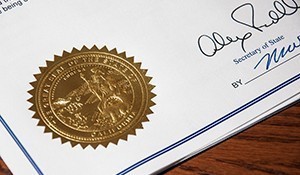LIST OF COUNTRIES FOR APOSTILLE AND CONSULAR LEGALIZATION
TRANSLATION COMPANY ALL SERVICES NOTARY SERVICES APOSTILLE LIST OF COUNTRIES FOR APOSTILLE AND CONSULAR LEGALIZATION
Apostille or consular legalization?
 Apostille is a way of giving legal force to documents in all countries that are parties to the Hague Convention of October 5, 1961. With this method, a special international stamp is affixed to the documents (original or notarized copy).
Apostille is a way of giving legal force to documents in all countries that are parties to the Hague Convention of October 5, 1961. With this method, a special international stamp is affixed to the documents (original or notarized copy).
For other countries, you need to go through the consular legalization procedure. In this case, we have to go through several stages: to make a copy at a notary, to make a notarized translation, to certify the document by the Ministry of Justice, the Ministry of Foreign Affairs and the embassy of the country of destination.
Russia also has bilateral agreements with some countries to simplify or abolish additional legalization or apostilization of documents, for example, the Minsk Agreement dated 1993.
List of countries participating in the Hague Agreement (as of November 2021)
A-B (Albania – Burundi)
- Albania – as of now some European countries do not recognize the Albanian Apostille (Germany, Greece and Spain). Russia and Albania have a Legal Aid Treaty dated October 30, 1995, so a notarized translation will suffice.
- American Samoa
- Andorra
- Antigua and Barbuda
- Argentina
- Armenia – the Minsk Agreement of January 22, 1993 was signed between Russia and Armenia, therefore, a notarized translation into Armenian is enough.
- Aruba
- Australia
- Austria
- Azerbaijan – Russia and Azerbaijan signed the Minsk Convention of January 22, 1993 on the mutual recognition of documents, so there is no need to issue an apostille, it is enough to make a notarized translation. Nevertheless, as practice shows, in Azerbaijan they often require an apostille for Russian diplomas.
- Bahamas
- Bahrain
- Bailiwick of Guernsey
- Bailiwick of Jersey
- Barbados
- Belarus– in accordance with the Minsk Convention, a notarized translation is enough.
- Belgium
- Belize
- Bermuda
- Bolivia
- Bosnia and Herzegovina – an agreement on recognition of documents has been signed, so usually a notarized translation is enough.
- Botswana
- Brazil
- British Antarctic Territory
- Brunei
- Bulgaria – for the use of Russian documents in Bulgaria, a notarized translation into Bulgarian is usually sufficient.
- Burundi
C-F (Cape Verde – French Polynesia)
- Cape Verde
- Cayman Islands
- Chile
- China (Macau and Hong Kong only) – consular legalization is required for other regions.
- Colombia – except for commercial documents (they require consular legalization).
- Cook Islands
- Costa Rica
- Croatia – Usually apostille is not required due to a bilateral agreement.
- Cyprus
- Czech Republic – there is an agreement between the Russian Federation and the Czech Republic dated July 18, 1997, so you can make a notarized translation into Czech.
- Denmark
- Dominica
- Dominican Republic – Austria, Belgium, Germany, Netherlands do not recognize apostille from the Dominican Republic.
- Ecuador
- Estonia – a number of documents have been signed between Russia and Estonia that simplify document flow, so an apostille is not required.
- Eswatini
- Falkland Islands
- Fiji
- Finland
- France
- French Polynesia
G-K (Georgia – Kyrgyzstan)
- Georgia – the Minsk Agreement has been signed between Russia and Georgia, therefore a notarized translation is sufficient.
- Germany
- Gibraltar
- Greece
- Grenada
- Guadeloupe
- Guam
- Guatemala
- Guianas
- Guyana
- Honduras
- Hungary
- Iceland
- India
- Ireland
- Isle Of Man
- Israel
- Italy
- Jamaica – joined the Convention quite recently (July 3, 2021), so it is better to clarify the need for apostille at the embassy.
- Japan
- Kazakhstan – in accordance with the Minsk Convention, a notarized translation is enough. Nevertheless, sometimes in Kazakhstan they require an apostille on Russian documents.
- Korea (Republic)
- Kosovo
- Kyrgyzstan – the Minsk Agreement was signed between Russia and Kyrgyzstan, therefore, it is enough to have a notarized translation.
L-O (Latvia – Oman)
- Latvia – previously there was an agreement abolishing the mandatory legalization of documents, but from April 1, 2019, all documents shall be apostilled.
- Lesotho
- Liberia – Apostille issued in Liberia is not accepted in Germany and Belgium. In the case of Russia, everything is fine, all documents can be apostilled.
- Liechtenstein
- Lithuania – usually apostille is not required in accordance with the Art. 13 of the Agreement “On Legal Assistance and Legal Relations in Civil, Family and Criminal Cases” dated July 21, 1992.
- Luxembourg
- Malawi
- Malta
- Marshall Islands
- Mauritius
- Mayotte
- Mexico
- Moldova – the Minsk Agreement has been signed, so it is enough to have a notarized translation. By the way, the Moldovan apostille is not accepted in Germany.
- Monaco
- Mongolia – there is a bilateral agreement between Mongolia and the Russian Federation, therefore apostille is usually not required.
- Montenegro – usually a notarized translation is enough.
- Montserrat
- Morocco
- Namibia
- Netherlands
- Netherlands Antilles
- New Caledonia
- New Zealand
- Nicaragua
- Niue
- North Macedonia – there is an agreement on legal assistance between Macedonia and the Russian Federation, therefore apostille is usually not required.
- Northern Mariana Islands – the Convention applies as to the possession of the United States, however, there is no information on the validity of the apostille on the official website. Better to ask the receiving party.
- Norway
- Oman
O-S (Oman – Switzerland)
- Palau – Apostille is accepted from June 23, 2020.
- Panama – due to a bilateral agreement, it is usually enough to translate and certify Russian documents with a notary, but it is better to check with the recipient.
- Paraguay
- Peru
- Philippines
- Poland – translation is usually enough, but it is better to check with the other party.
- Portugal
- Puerto Rico
- Réunion
- Romania – translation is usually enough, as a bilateral agreement was signed with the USSR.
- Russia
- Saint Helena
- Saint Kitts and Nevis
- Saint Lucia
- Saint Pierre and Miquelon
- Saint Vincent and the Grenadines
- Salvador
- Samoa
- San Marino
- São Tomé and Príncipe
- Serbia – usually a notarized translation into Serbian is enough, since bilateral agreements on the recognition of documents were signed.
- Seychelles
- Slovakia
- Slovenia
- South Africa
- Spain – Russia and Spain signed an Agreement on abolition of the requirement for legalization of documents issued by Civil Registry Office No. 6208 dated 04/18/1985, therefore, on the originals of certificates of birth, marriage, etc. apostille is not required. However, based on our practice, we recommend that such documents be apostilled.
- Suriname
- Sweden
- Switzerland
T-W (Tajikistan – Wallis and Futuna)
- Tajikistan – thanks to the Minsk Convention of January 22, 1993, concluded between Russia and Tajikistan, a notarized translation is usually sufficient.
- Tonga
- Trinidad and Tobago
- Tunisia – signed the Convention on March 30, 2018, but for now it is still worth clarifying at the place of submission of documents. Previously, consular legalization was required.
- Turkey
- Turks and Caicos Islands
- Ukraine – as well as with most of the countries of the former USSR, the Minsk Agreement was signed with Ukraine, which cancels the requirement for documents to be apostilled. Nevertheless, due to the tense political situation, it is recommended to clarify this requirement with the receiving party.
- United Kingdom
- Uruguay
- USA
- Uzbekistan – Apostille is not required due to the Minsk Agreement.
- Vanuatu
- Venezuela
- Virgin Islands (British)
- Virgin Islands (United States)
- Wallis and Futuna
Which countries will definitely require consular legalization?
A-E (Abkhazia – Ethiopia)
- Abkhazia – is a partially recognized country, apostille is not accepted. It is recommended to clarify the legalization procedure at the Embassy of Abkhazia.
- Afghanistan
- Algeria
- Angola
- Bangladesh
- Benin
- Bhutan
- Burkina Faso
- Cambodia
- Cameroon
- Canada
- Central African Republic
- Chad
- Colombia – commercial documents must undergo consular legalization. Apostille is suitable for other documents.
- Comoros
- Congo
- Côte d’Ivoire
- Cuba – there is an agreement on mutual legal assistance between Cuba and Russia, therefore, documents for Cuba usually only need to be translated and certified by a notary. But we recommend that you check this information in advance at the place of presentation of the documents.
- Djibouti
- East Timor
- Egypt
- Equatorial Guinea
- Eritrea
- Ethiopia
G-N (Gabon – Nigeria)
- Gabon
- Gambia
- Ghana
- Guinea
- Guinea-Bissau
- Haiti
- Indonesia
- Iran
- Iraq
- Jordan
- Kenya
- Kiribati – the way of legalization must be clarified with the British Embassy.
- Kuwait
- Laos
- Lebanon
- Libya
- Madagascar
- Malaysia
- Maldives
- Mali
- Mauritania
- Micronesia
- Mozambique
- Myanmar (Burma)
- Nauru
- Nepal
- Niger
- Nigeria
P-Z (Pakistan – Zimbabwe)
- Pakistan
- Palestine
- Papua New Guinea
- People’s Republic of China – except for Macau and Hong Kong (in these regions apostille is accepted).
- Qatar
- Rwanda
- Saudi Arabia
- Senegal
- Sierra leone
- Singapore
- Solomon islands
- Somalia
- South Ossetia – a partially recognized state. The official website of the Hague Convention says that apostille from the territory of South Ossetia is not accepted. It is recommended to check the legalization procedure with the receiving party.
- South Sudan
- Sri Lanka
- Sudan
- Syria
- Taiwan
- Tanzania
- Thailand
- Togo
- Tuvalu
- Uganda
- United Arab Emirates
- Vatican
- Yemen
- Zambia
- Zimbabwe
What countries will need just a notarized translation?
There are also countries with which Russia has bilateral agreements on the recognition of documents and other documents. Here is the list of such countries:
Member States of the Minsk Convention as of January 22, 1993
The following countries were and/or are parties to the “Convention on Legal Assistance and Legal Relations in Civil, Family and Criminal Matters” (Minsk Convention, January 22, 1993), which simplifies document flow between its members, and abolishes the requirements for apostille or consular legalization. Nevertheless, we recommend that you always clarify the need for additional legalization at the place of presentation of the documents.
- Armenia
- Azerbaijan – Russia and Azerbaijan signed the Minsk Convention of January 22, 1993 on the mutual recognition of documents, so there is no need to issue an apostille, it is enough to make a notarized translation. Nevertheless, as practice shows, in Azerbaijan they often require an apostille for Russian diplomas.
- Belarus
- Georgia
- Kazakhstan – in accordance with the Minsk Convention, a notarized translation is enough. Nevertheless, sometimes in Kazakhstan they require an apostille on Russian documents.
- Kyrgyzstan – the Minsk Agreement was signed between Russia and Kyrgyzstan, therefore, it is enough to have a notarized translation.
- Moldova
- Russia
- Tajikistan
- Turkmenistan – usually a notarized translation into the Turkmen language is enough.
- Ukraine – as well as with most of the countries of the former USSR, the Minsk Agreement was signed with Ukraine, which cancels the requirement for documents to be apostilled. Nevertheless, due to the tense political situation, it is recommended to clarify this requirement with the receiving party.
- Uzbekistan
Other agreements and exceptions
Here is the list of countries with which Russia entered into agreements on simplifying the legalization of documents. Some countries also may not require an apostille or consular legalization despite the absence of any formal agreements. We strongly recommend that you clarify the need for additional legalization with the receiving party.
- Albania – Russia and Albania have a Legal Aid Treaty dated October 30, 1995, so a notarized translation will suffice.
- Bosnia and Herzegovina – an agreement on recognition of documents has been signed, so usually a notarized translation is enough.
- Bulgaria – for the use of Russian documents in Bulgaria, a notarized translation into Bulgarian is usually sufficient.
- Croatia – Usually apostille is not required due to bilateral agreement, but it is recommended to clarify requirements in advance.
- Cuba – there is an agreement on mutual legal assistance between Cuba and Russia, therefore, documents for Cuba usually only need to be translated and certified by a notary. But we recommend that you check this information in advance at the place of presentation of the documents.
- Czech Republic – there is an agreement between the Russian Federation and the Czech Republic dated July 18, 1997, so you can make a notarized translation into Czech.
- DPRK (North Korea) – there is no exact information, but most likely it will be enough to make a notarized translation. It is recommended to check with the embassy.
- Estonia – a number of documents have been signed between Russia and Estonia that simplify document flow, so usually an apostille is not required.
- Lithuania – usually apostille is not required in accordance with the Art. 13 of the Agreement “On Legal Assistance and Legal Relations in Civil, Family and Criminal Cases” dated July 21, 1992.
- Mongolia – there is a bilateral agreement between Mongolia and the Russian Federation, therefore apostille is usually not required.
- Montenegro – usually a notarized translation is enough.
- North Macedonia – there is an agreement on legal assistance between Macedonia and the Russian Federation, therefore apostille is usually not required.
- Poland – translation is usually enough, but it is better to check with the other party.
- Romania – translation is usually enough, as a bilateral agreement was signed with the USSR.
- Serbia – usually a notarized translation into Serbian is enough, since bilateral agreements on the recognition of documents were signed.
- Spain – Russia and Spain signed an Agreement on abolition of the requirement for legalization of documents issued by Civil Registry Office No. 6208 dated 04/18/1985, therefore, on the originals of certificates of birth, marriage, etc. apostille is not required. However, based on our practice, we recommend that such documents be apostilled.
- Vietnam – there is an agreement on legal assistance dated August 25, 1998, therefore, Russian documents shall be translated into Vietnamese language and certified by the Vietnamese embassy.
ОФОРМИТЬ ЗАКАЗ
Delivery
from 350 rubles within the Moscow MKAD Ring Road
Notarization
Apostille
in the Ministry of Justice, the Registry Office, the Ministry of Internal Affairs of Moscow
Translation company stamp
:disabled="disDotarialZaverenie"Discount: {{promoSkidka}} ₽ %
Try another one
Delivery
from 350 rubles within the Moscow MKAD Ring Road
Notarization
included by defaultApostille
in the Ministry of Justice, the Registry Office, the Ministry of Internal Affairs of Moscow
Discount: {{promoSkidka}} ₽ %
Try another one
Delivery
from 350 rubles within the Moscow MKAD Ring Road
Notarization
included by defaultDiscount: {{promoSkidka}} ₽ %
Try another one
Delivery
from 350 rubles within the Moscow MKAD Ring Road
Discount: {{promoSkidka}} ₽ %
Try another one
Discount: {{promoSkidka}} руб %
Try another one
Discount: {{promoSkidka}} руб %
Try another one
Apostille
| Service | Price(for 1 document, including state duty) | Date due | |
|---|---|---|---|
| Apostille of documents in the Ministry of Justice (apostille of originals of notarial documents and notarized copies) | 4500 i | 4-5 working days | |
| Apostille of documents in the Civil Acts Registration Office (apostille of original documents issued by Civil Registry Offices of Moscow and Moscow Region) | 4500 i | 4-5 working days | |
| Apostille of documents in the Ministry of Internal Affairs (apostille of original documents issued by the Ministry of Internal Affairs of Moscow and Moscow Region) | 4500 i | 4-5 working days | |
| Apostille of documents in the Ministry of Education * (apostille of original copies of certificates, diplomas and other educational documents) | 5000 i | from 45 working days | |
| Urgent apostille of documents in the Civil Acts Registration Office, the Ministry of Justice, the Ministry of Internal Affairs | 13500 i | from 1 working day | |
| * A notarized power of attorney for our employee is required from the diploma owner. | |||
Feedback from our customers






